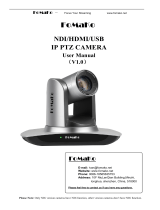
19
Operating Precautions
Shoot under the proper lighting conditions.
To produce pictures with eye-pleasing colors, shoot
under the proper lighting conditions. The pictures may
not appear with their proper colors when shooting
under fluorescent lights. Select the proper lighting as
required.
To ensure a stable performance in the long term
Using the unit for prolonged periods in locations
where the temperature and humidity levels are high
will cause its parts to deteriorate, resulting in a
reduction of its service life. (Recommended
temperature: Max. 35 oC (95 °F))
Ensure that a cooling unit or heating unit will not blow
any air directly toward the installation location.
Do not point the camera at strong lights.
When parts of the MOS sensor are exposed to
spotlights or other strong lights, blooming (a
phenomenon where the edges of strong lights
become blurred) may occur.
What happens with high-brightness subjects
Flare may occur if an extremely bright light source is
pointed at the lens. In a case like this, change the
angle or take some other remedial action.
Color bars
Color bars are used to adjust the color phase, and the
widths and positions of these bars may differ from
other models.
Concerning PoE+ power supply
The unit complies with the IEEE802.3at standard.
Use a compatible Ethernet hub and PoE+ injector to
use a PoE+ power supply.
Turn off the power before connecting or
disconnecting the cables.
Always be sure to turn off the power before
connecting or disconnecting the cables.
When using the automatic functions
In the [Scene] such as the camera menu, the initial
settings on some items has been set to auto, making
it impossible for these items to be operated manually.
To operate them manually, switch from the auto
settings to the manual settings as required.
When using the ATW (auto tracking white
adjustment) function under fluorescent lights, the
white balance may vary.
Operating temperature range
Avoid using the unit in cold locations where the
temperature drops below 0 oC (32 °F) or hot locations
where the temperature rises above 40 oC (104 °F)
since these temperatures downgrade the picture
quality and adversely affect the internal parts.
Also, it may take a few minutes to stabilize the image
when used in low temperatures. We recommend that
you turn on this unit before use.
Concerning the HDMI interface standard
This unit has been certified as HDMI-compatible, but
on rare occasions images may not be displayed
depending on the HDMI device which has been
connected to the unit.
When the unit is not in use
Turn off the unit’s power when it is not in use. When
the unit is no longer going to be used, do not leave it
lying around, but be absolutely sure to dispose of it
properly.
Do not touch the optical system.
Under no circumstances must they be touched. In the
unlikely event that they have become dusty, remove
the dust by using a camera blower or by wiping them
gently with a lens cleaning paper.
Do not point the camera directly at the sun or a
laser beam, no matter whether it is turned on or
not.
Taking images of the sun, laser beams, or other
brightly lit subjects for prolonged periods of time may
damage the MOS sensor.
Personal computer used
If the same image is displayed for a prolonged period
on a PC monitor, the monitor may be damaged. Use
of a screen saver is recommended.
Concerning the IP address setting
Do not run the Easy IP Setup Software on a multiple
number of personal computers for a single camera
and set the IP address at the same time.
Otherwise, you will be unable to complete the proper
procedure and set the IP address correctly.





















